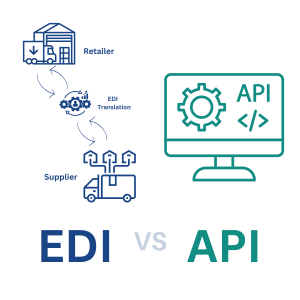Introduction
The EDI in Supply Chain Management allows businesses to exchange data electronically using a standardized format. This helps reduce errors and costs associated with manual processes.
Today EDI in supply chain management is more important than ever, because of the pandemic several industries are affected by supply chain issues and the whole world is facing disruptions caused by delays in the supply chain.
EDI can give you the capabilities your business needs to create a well-integrated ecosystem and enable fast and secure exchanges of essential warehousing and shipping documents, including bills of lading, shipping status records, shipment authorizations, advanced shipment notices, customs documents, and inventory lists and many more.
5 Ways EDI In Supply Chain Management Can Help Your Business Grow
Reduce Costs by Eliminating Manual Data Entry
EDI in the supply chain is an open standard that enables electronic communication between trading partners. It provides a common language for exchanging business documents such as purchase orders, invoices, shipping labels, and packing lists.
Increase Productivity by Automating Processes
EDI in the supply chain helps businesses automate processes so they can focus on more strategic activities. This means that you can spend less time managing manual tasks and more time growing your business.
Gain Visibility into Inventory Levels
One of the biggest challenges for any company is knowing how much inventory they have at any given moment. With EDI in supply chain, you can gain visibility into inventory levels by using barcodes. Barcodes help you track inventory throughout the entire process, from production to distribution.
Boost Customer Service by Improving Communication
Another benefit of EDI in the supply chain is that it helps improve customer service. By communicating more efficiently, you can reduce the number of back orders and out-of-stock situations. This means customers will receive faster delivery times and less frustration.
Streamline Operations by Integrating Systems
EDI in the supply chain has been proven to help businesses streamline operations. It allows them to connect and share data across departments. This makes it easier for everyone involved to work together as a team.
3 Upcoming EDI Trends in Supply Chain Management (SCM)
As with every industry, there have been lots of new technological advancements in EDI here are some of the trends,
- Adopting Cloud EDI technology
Cloud EDI has completely redefined the EDI industry on how businesses exchange EDI documents. Today businesses of all sizes use cloud EDI to exchange EDI documents from anywhere in the world with just the internet and web browser. You don’t require complicated integrations, no software to install, and does not require highly skilled EDI professionals.
- EDI and API Integrations
APIs can further help improve the EDI ecosystem. With many custom APIs, the EDI system can now integrate with many other internal business systems like ERPs, finance software, and many more. Making it easier for businesses to translate EDI documents that better suit their business systems. EDI and API integrations are still ongoing work and potentially bring a lot more applications in the years to come
- EDI in eCommerce
The eCommerce industry has grown significantly in the last 10 years especially post-pandemic the industry has seen rapid growth in many businesses stepping into eCommerce to increase their customer base. eCommerce removes the boundaries for businesses and allows them easily to enter a new market and target audience around the world. Now integrating EDI with e-commerce is providing endless opportunities for customers such as providing more choices, competitive pricing, fast shipping, real-time tracking, mobile support, and personalized shopping experiences.
Here is the list of EDI Transaction Document Codes used by the Supply Chain Industry (Logistics and Warehousing)
EDI X12 Transaction Number | EDI Transaction Name / Document Type |
EDI 883 | Market Development Fund Allocation |
EDI 884 | Market Development Fund Settlement |
EDI 886 | Customer Call Reporting |
EDI 891 | Deduction Research Report |
EDI 940 | Warehouse Shipping Order |
EDI 943 | Warehouse Stock Transfer Shipment Advice |
EDI 944 | Warehouse Stock Transfer Receipt Advice |
Warehouse Shipping Advice | |
EDI 947 | Warehouse Inventory Adjustment Advice |
EDI 990 | Response to a Load Tender |
EDI X12 Transaction Number | EDI Transaction Name / Document Type |
EDI 219 | Logistics Service Request |
EDI 220 | Logistics Service Response |
EDI 222 | Cartage Work Assignment |
EDI 223 | Consolidators Freight Bill and Invoice |
EDI 224 | Motor Carrier Summary Freight Bill Manifest |
EDI 225 | Response to a Cartage Work Assignment |
EDI 250 | Purchase Order Shipment Management Document |
EDI 853 | Routing and Carrier Instruction |
EDI 854 | Shipment Delivery Discrepancy Information |
EDI 856 | Ship Notice/Manifest |
EDI 857 | Shipment and Billing Notice |
EDI 858 | Shipment Information |
EDI 862 | Shipping Schedule |
EDI 882 | Direct Store Delivery Summary Information |
Affordable and Best EDI Solution for Supply Chain Management
For over 35 years, Commport Communications has been providing the most affordable and best EDI solutions in the market. By helping companies solve complex integration issues and providing complete EDI communication between business partners.
Improve your business process and maximize your supply chain performance with our EDI solutions. Contact us today for a free consultation and demo.
Ready to find out more about Commport EDI Solution?
Need Help? Download: EDI Buyers Guide
Unlock the full potential of your supply chain with our comprehensive EDI Buyer's Guide — your first step towards seamless, efficient, and error-free transactions
Frequently Asked Questions
EDI in Supply Chain Management facilitates the electronic exchange of business documents like orders, invoices, and shipment notices, streamlining communication and enhancing efficiency throughout the supply chain
EDI improves collaboration by providing a standardized and automated means of communication. It ensures that trading partners share accurate and timely information, reducing delays and improving overall coordination in the supply chain.
Yes, EDI can be integrated with existing supply chain systems. EDI solutions are designed to interface with various enterprise resource planning (ERP) and warehouse management systems, ensuring compatibility and smooth integration.
EDI enhances supply chain efficiency by automating manual processes, reducing paperwork, minimizing errors, and accelerating the exchange of critical information. This results in faster order processing, improved inventory management, and enhanced overall operational efficiency.
Yes, EDI is suitable for businesses of all sizes in supply chain management. It offers scalable solutions that can be adapted to the unique needs and requirements of small, medium, and large enterprises, fostering improved communication and collaboration within the supply chain.




